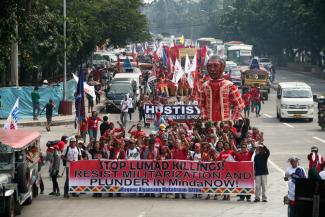Rule of law
Recent atrocities

“There are virtually no social services for most Lumad communities”, says Victoria Tauli-Corpuz, UN special rapporteur on the rights of indigenous peoples. For instance, one village she recently visited has no school: “Children have to walk to a village seven kilometres away to get primary education.” She adds that most of the families depend on subsistence farming and cannot afford to send older children to nearby towns that offer secondary education. “No one in the community has ever made it to college,” Tauli-Corpuz, who belongs to an indigenous community herself, points out.
To address such problems, church groups like the Rural Missionaries of the Philippines and various non-governmental organisations have helped Lumad communities set up schools. One example is the Alternative Learning Center for Livelihood and Agricultural Development (ALCADEV) in the town of Lianga.
As Tauli-Corpuz told the 31st Ecumenical Philippine Conference in Bonn in October, a paramilitary group murdered Emerito Samarca, ALCADEV’s executive director, on 1 September 2015. Dionel Campos and Bello Sinzo, two indigenous leaders, were murdered in the same village that day. The atrocities have become known as the “ALCADEV killings”. The UN official says she is convinced that the perpetrators are backed by the regular security forces.
ALCADEV was established in 2004 to provide secondary education to indigenous youth in eastern Mindanao. The non-governmental institution was accredited by the Philippine Department of Education and has received awards for its excellent programmes. Like other alternative schools in the region, it helps students and their communities understand their rights and defend their ancestral lands.
Because of various mining projects, land rights are a conflict-prone issue in the region, says Tauli-Corpuz. According to her, the government has decided that these schools must not be allowed to continue because they are teaching the people and turning them “into Communists”.
Tauli-Corpuz says that the Philippine government aspires to “clean up the presence of insurgents”. Operations, however, affect everybody – the church, non-governmental organisations and even some government officials who are perceived to sympathise with the left-wing rebels. The government has allowed the army to occupy non-governmental schools for Lumad children. It is against this backdrop that murders like the ALCADEV killings occur, Tauli-Corpuz says. According to her, more than 4,000 Lumads have fled from their homes after the ALCADEV killings and now live in tents at an evacuation centre in the provincial capital of Tandag City.
The UN official has gathered accounts of the incident from the victims’ relatives. They told her that the murders were committed by people they knew from their own community and that they belonged to a paramilitary group called Magahat Bagani. They used to be insurgents and, after they surrendered, the military recruited them, providing them with arms and salaries, Tauli-Corpuz reports. Members of the Lumad community say they saw government soldiers working with Magahat Bagani members prior to the killings. The Philippine authorities deny any link to the Magahat Bagani. The government has promised to support investigations of the incident.
Meanwhile, several hundred Lumads, peasants and human-rights activists from different parts of Mindanao have gone to Manila in order to demand support for their communities. Among other things, they want regular troops and informal militias to withdraw from their communities and schools.







